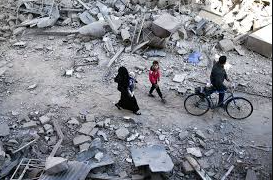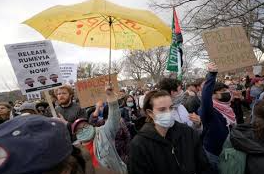
UK Foreign Secretary Praises Resolution, While Aid Groups Demand Immediate Ceasefire for Effective Humanitarian Response
Lord David Cameron has expressed optimism following the UN Security Council’s adoption of a watered-down resolution aimed at accelerating humanitarian aid to Gaza. Despite the lack of a call for an immediate ceasefire, Cameron emphasised the growing unity among nations in addressing the ongoing crisis, following the vote that saw 13 countries in favour, with the US and Russia abstaining.
The UK Foreign Secretary welcomed the resolution, highlighting its endorsement of steps towards a “sustainable ceasefire.” This marks a shift towards a more unified stance on the humanitarian situation in Gaza, Cameron said, noting that the resolution laid the groundwork for continued diplomatic efforts. He reiterated that a sustainable ceasefire must ensure Hamas can no longer threaten Israel with attacks, which he believes is crucial for long-term peace.
However, humanitarian organisations and charities have criticised the resolution for not going far enough. They have urged the UK to push for an immediate and permanent cessation of violence to enable the safe delivery of aid. Organisations such as Amnesty International and ActionAid have warned that without a ceasefire, humanitarian efforts will continue to be hindered.
Labour leader Sir Keir Starmer also welcomed the vote but stressed the urgency of a humanitarian truce. He called for intensive diplomacy to create conditions for peace, with specific demands for Hamas to release all hostages and for Israel to cease its bombing campaign and allow humanitarian assistance into Gaza.
The US has been a key player in shaping the resolution, removing a provision calling for an “urgent suspension of hostilities” in a move that was seen as a significant diplomatic setback. Despite this, the vote marks the first successful passage in the UN Security Council concerning the war, following US vetoes of two earlier resolutions calling for humanitarian pauses and a full ceasefire.
While some progress has been made, aid groups remain vocal in their demand for stronger measures. Christian Aid and Oxfam GB both stated that only a permanent ceasefire could ensure the delivery of the necessary scale of humanitarian aid, with Oxfam’s interim CEO calling the failure to include such a call a “profound dereliction of duty.”
The conflict, ignited by Hamas’s attacks on October 7, has resulted in the deaths of over 20,000 people in Gaza. Israel’s military actions continue to devastate the region, with nearly 85% of Gaza’s population displaced and large parts of the territory levelled.
The resolution follows several weeks of intense negotiations and represents a partial victory in the effort to address the humanitarian crisis. However, the need for stronger action remains pressing, with many insisting that only an immediate ceasefire will pave the way for peace and aid delivery.












